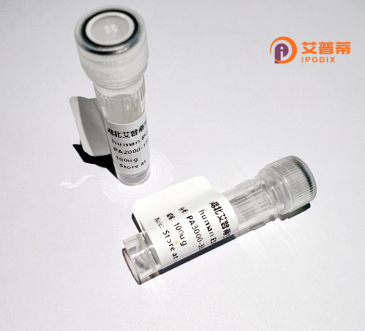
| 纯度 | >90%SDS-PAGE. |
| 种属 | Human |
| 靶点 | PKP4 |
| Uniprot No | Q99569 |
| 内毒素 | < 0.01EU/μg |
| 表达宿主 | E.coli |
| 表达区间 | 12-110 aa |
| 活性数据 | EGQPQTRQEAASTGPGMEPETTATTILASVKEQELQFQRLTRELEVERQIVASQLERCRLGAESPSIASTSSTEKSFPWRSTDVPNTGVSKPRVSDAVQ |
| 分子量 | 36.63 kDa |
| 蛋白标签 | GST-tag at N-terminal |
| 缓冲液 | PBS, pH7.4, containing 0.01% SKL, 1mM DTT, 5% Trehalose and Proclin300. |
| 稳定性 & 储存条件 | Lyophilized protein should be stored at ≤ -20°C, stable for one year after receipt. Reconstituted protein solution can be stored at 2-8°C for 2-7 days. Aliquots of reconstituted samples are stable at ≤ -20°C for 3 months. |
| 复溶 | Always centrifuge tubes before opening.Do not mix by vortex or pipetting. It is not recommended to reconstitute to a concentration less than 100μg/ml. Dissolve the lyophilized protein in distilled water. Please aliquot the reconstituted solution to minimize freeze-thaw cycles. |
以下是关于重组人PKP4蛋白的3篇参考文献,内容简括:
1. **文献名称**:*Plakophilin 4 regulates cell-cell adhesion through the RhoA/ROCK pathway in human keratinocytes*
**作者**:Hatzfeld M, et al.
**摘要**:该研究阐明PKP4通过调控RhoA/ROCK信号通路影响角质形成细胞的黏附功能,利用重组人PKP4蛋白发现其缺失导致细胞间连接异常,提示其在表皮屏障中的关键作用。
2. **文献名称**:*Recombinant expression and functional characterization of plakophilin 4 in desmosome assembly*
**作者**:Bass-Zubek AE, et al.
**摘要**:作者通过哺乳动物表达系统获得重组人PKP4蛋白,证明其参与桥粒组装,并通过互作实验揭示PKP4与桥粒核心蛋白(如desmoplakin)的相互作用机制。
3. **文献名称**:*PKP4 suppresses tumor metastasis by regulating E-cadherin stability in lung adenocarcinoma*
**作者**:Li Y, et al.
**摘要**:该研究利用重组PKP4蛋白进行功能分析,发现其通过稳定E-钙黏蛋白抑制肺癌细胞迁移和侵袭,表明PKP4可能作为肿瘤抑制因子调控上皮-间质转化(EMT)。
如有更具体的研究方向需求,可进一步补充关键词优化检索!
Plakophilin-4 (PKP4), a member of the plakophilin family of armadillo-repeat proteins, is a crucial component of cell junction complexes, particularly desmosomes and adherens junctions. It facilitates intercellular adhesion and cytoskeletal organization, maintaining tissue integrity in epithelial and cardiac cells. Structurally, PKP4 contains nine central ankyrin repeats that mediate protein-protein interactions and a conserved N-terminal domain for binding desmosomal components like desmoplakin. Beyond its structural role, PKP4 participates in diverse cellular processes, including cell polarity, migration, proliferation, and apoptosis, often through crosstalk with signaling pathways such as Wnt/β-catenin. Dysregulation of PKP4 has been linked to cancer progression, skin disorders, and cardiomyopathy. Recombinant human PKP4 protein, typically produced in bacterial or mammalian expression systems, serves as a vital tool for studying its molecular interactions, post-translational modifications, and role in disease mechanisms. Its applications span in vitro binding assays, structural analysis, and screening for therapeutic compounds targeting cell adhesion-related pathologies.
×